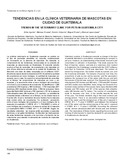Tendencias en la clínica veterinaria de mascotas en Ciudad de Guatemala

Visualizar/
Data
2021Palabras Clave
Perro, Gato, Especies menores, Sexo biológicoDog, Cat, Minor species, Biological sex
Metadatos
Mostrar registro completoResumo
La práctica veterinaria en Guatemala presenta un cambio en
el tipo de pacientes atendidos en consulta, contemplando
un incremento en la atención de mascotas. No obstante, la
comprensión de las tendencias involucradas en la consulta de
mascotas es desconocida en Guatemala. El presente estudio
explora el flujo de consultas, de propietarios y de mascotas en
una clínica veterinaria ubicada en la ciudad de Guatemala. Se
describió una base de datos compilada con el software QVET
durante los meses de abril a diciembre 2.019. Se estimó la cantidad
de propietarios por sexo biológico, la cantidad de mascotas por
especie, sexo y raza. Se exploró el comportamiento de consultas
en el tiempo, las proporciones de mascotas por sexo y por
especies, y la asociación entre el sexo biológico del propietario
con el sexo y con la especie de la mascota. Se identificaron 1.290
propietarios (797mujeres y 493 hombres), 1.753 mascotas (931
hembras y 822 machos) siendo éstos, 1.592 de la especie Canis
lupus familiaris (842 hembras y 750 machos) y 161 de la especie
Felis silvestris catus (89 hembras y 72 machos). La cantidad de
consultas tiende a disminuir en el tiempo, en los meses hacia el
final del año. El perro domestico de sexo hembra fue la mascota
más común entre los propietarios. Se evidenció asociación
entre el sexo biológico del propietario y el sexo biológico de la
mascota (Ji-cuadrado = 3.6619, df = 1, P=0,05567) y entre el
sexo biológico del propietario y la especie animal de la mascota
(Ji-cuadrado=3,7803 = 3.7803, df = 1, P= 0,05186. Según los
resultados obtenidos, las mujeres están asociadas a mascotas
hembras y a los gatos domésticos. Se discuten las implicaciones
de estas tendencias respecto a los servicios y formación de los
veterinarios para atender la demanda de consulta de mascotas
en Guatemala.
Colecciones
Información Adicional
| Otros Títulos | Trends in the veterinary clinic for pets in Guatemala City |
| Correo Electrónico | malepelopez@gmail.com |
| Editor | SaberULA |
| ISSN | 0798-2259 |
| ISSN Electrónico | 2477-944X |
| Resumen en otro Idioma | Veterinary practice in Guatemala presents a change in the type of patients attended in consultation, contemplating an increase in pet care. However, an understanding of the trends involved in pet consultation is unknown in Guatemala. This study explores the flow of inquiries, owners, and pets at a veterinary clinic located in Guatemala City. A database compiled with the QVET software from April to December 2,019 was described. The number of owners by biological sex, the number of pets by species, sex, and the breed was estimated. The behavior of queries over time, the proportions of pets by sex and by species, and the association between the biological sex of the owner with the sex and with the species of the pet was explored. One thousand two hundred ninty owners (797 women and 493 men), 1,753 pets (931 females and 822 males) were identified, these being one thousand five hundred ninety and two of the species Canis lupus familiaris (842 females and 750 males) and 161 of the species Felis silvestris catus (89 females and 72 males). The number of consultations tends to decrease over time, in the months towards the end of the year. The female domestic dog is the most common pet among owners. There is an association between the biological sex of the owner and the biological sex of the pet (X-squared = 3.6619, df = 1, P-value = 0.05567) and between the biological sex of the owner and the animal species of the pet (X- squared = 3.7803, df = 1, P-value = 0.05186). According the obtained results, women wereassociated with female pets and domestic cats. The implications of these trends regarding the services and training of veterinarians to meet the demand for pet consultation in Guatemala are discussed. |
| Colación | 186-191 |
| País | Venezuela |
| Institución | Universidad del Zulia (LUZ) Universidad de Los Andes (ULA) |
| Publicación Electrónica | Revista Científica |
| Sección | Revista Científica: Artículos |





